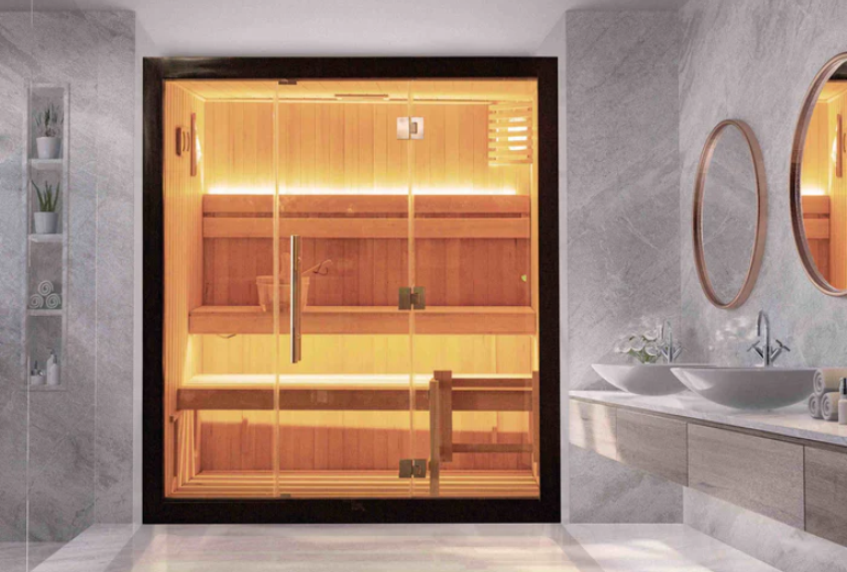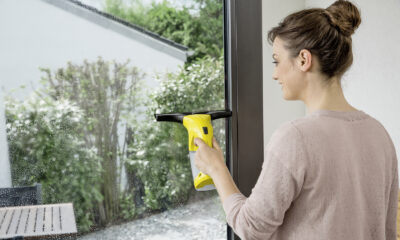Health
Barrel Saunas: Combining Tradition with Modern Efficiency

Barrel saunas represent a harmonious blend of ancient wellness practices and contemporary design, offering a unique experience that caters to both traditional enthusiasts and modern users. These saunas are deeply rooted in the rich history of Finnish sauna culture, where the practice of heat bathing has been cherished for centuries for its health benefits and communal aspects. Today, barrel saunas bring this tradition into the modern era with advanced materials, efficient heating systems, and stylish aesthetics, making them a popular choice for a wide range of users. Whether installed in a backyard or integrated into a home, barrel saunas from We Are Sauna provide an unparalleled blend of tradition and innovation. We recommend you to learn more about 4 person barrel saunas or 4 person indoor saunas here.
Historical Roots and Modern Appeal
The origins of sauna use can be traced back to ancient Finland, where saunas were central to daily life and community gatherings. These traditional saunas were typically built from logs and heated by wood-burning stoves, creating a warm, inviting atmosphere that promoted relaxation and health. The barrel sauna design, with its distinctive cylindrical shape, pays homage to this heritage while incorporating modern efficiency. This shape not only maximizes interior space but also enhances heat circulation, allowing the sauna to heat up quickly and maintain consistent temperatures with minimal energy use. The fusion of historical design with contemporary efficiency makes barrel saunas a perfect example of how traditional practices can evolve to meet modern needs.
We Are Sauna has perfected this balance, creating barrel saunas that offer both aesthetic appeal and functional benefits. The use of high-quality, sustainably sourced wood such as cedar and spruce ensures durability and a natural, rustic charm. These materials are chosen not only for their visual appeal but also for their excellent thermal properties, which help maintain the sauna’s internal climate. This attention to detail in both design and material selection highlights how barrel saunas bridge the gap between past and present, providing a timeless wellness experience that fits seamlessly into contemporary lifestyles.
Key Features and Efficiency
The unique design of barrel saunas is not merely for aesthetic purposes; it also significantly enhances their functionality. The cylindrical shape of the sauna reduces the volume of air that needs to be heated, making it more energy-efficient compared to traditional rectangular designs. This efficiency translates to faster heating times and lower operating costs, making barrel saunas an eco-friendly choice for environmentally conscious users. Additionally, the compact footprint of a barrel sauna allows it to be installed in smaller spaces, making it an ideal option for urban dwellers with limited outdoor areas.
Modern barrel saunas from We Are Sauna are equipped with state-of-the-art heating systems that can be customized to suit individual preferences. Whether using traditional wood-burning stoves or contemporary electric heaters, these systems ensure a consistent and comfortable sauna experience. Advanced features such as digital controls and programmable settings offer users precise control over temperature and session duration, enhancing convenience and user satisfaction. The combination of traditional sauna benefits with modern efficiency and customization options makes barrel saunas an attractive addition to any wellness routine.
Health Benefits and Expert Endorsements
The health benefits of regular sauna use are well-supported by scientific research and expert endorsements. Dr. Jari Laukkanen, a leading researcher in cardiovascular health, has highlighted the positive impact of sauna bathing on heart health, including improved circulation, reduced blood pressure, and decreased risk of cardiovascular disease. The intense heat of the sauna promotes sweating, which helps to detoxify the body by flushing out toxins and impurities. This process not only cleanses the skin but also supports overall immune function. Regular sauna sessions have also been shown to alleviate muscle soreness, improve joint mobility, and enhance mental clarity.
Mental health benefits are equally significant, with many users reporting reduced stress and improved sleep quality after regular sauna use. Dr. Rhonda Patrick, a health and wellness expert, notes that the heat exposure in saunas can stimulate the production of endorphins, the body’s natural “feel-good” chemicals, leading to enhanced mood and relaxation. These benefits are amplified by the serene and meditative environment of a barrel sauna, providing a holistic approach to wellness that addresses both physical and mental health. The endorsement of health experts further underscores the value of incorporating a barrel sauna into a regular wellness routine.
User Testimonials and Real-Life Experiences
Real-life experiences from users of We Are Sauna’s barrel saunas highlight the transformative impact of these wellness retreats. Jane and Mark Thompson, homeowners who installed a barrel sauna in their backyard, share their positive experience: “Our barrel sauna has become an integral part of our daily routine. The design is not only beautiful but incredibly efficient. We feel rejuvenated after each session and have noticed significant improvements in our overall health.” Such testimonials reflect the widespread satisfaction and health benefits that users enjoy, making barrel saunas a valuable investment for any home.
Other users have praised the ease of installation and maintenance of these saunas. Mark Anderson, who set up his barrel sauna on a small deck, mentions, “The assembly process was straightforward, and the quality of the materials is evident. It’s a low-maintenance addition that provides high benefits. We’ve recommended it to all our friends.” These real-life stories illustrate how We Are Sauna’s barrel saunas can seamlessly integrate into various living spaces, offering both practical and wellness advantages. The combination of positive user experiences and expert endorsements underscores the appeal of barrel saunas as a holistic wellness solution.
Embrace Tradition and Modernity with We Are Sauna
Barrel saunas from We Are Sauna encapsulate the perfect blend of traditional sauna practices and modern efficiency. Their unique design, efficient heating systems, and high-quality materials make them a standout choice for anyone looking to enhance their wellness routine. The health benefits of regular sauna use, supported by scientific research and user testimonials, highlight the value of investing in a barrel sauna. Whether you have a spacious backyard or a compact urban patio, these saunas offer a versatile and luxurious wellness retreat that fits seamlessly into any lifestyle. Experience the luxury and health benefits of owning a barrel sauna from We Are Sauna, and enjoy a timeless tradition adapted for the modern age.
Health
US Expands Measles Vaccination Guidance Amid Global Surge in Cases
Health
Irish Hospital Leads Charge to Cut Nitrous Oxide Waste Amid Climate Concerns

St John’s Hospital in Limerick has become one of the first medical facilities in Ireland to take decisive action against the environmental impact of nitrous oxide emissions by deactivating its central pipeline system for the gas, long used as an anaesthetic. The move is part of a growing effort in the healthcare sector to reduce its carbon footprint and curb avoidable waste.
Nitrous oxide, commonly known as laughing gas, has been used in hospitals for decades to relieve pain and anxiety during procedures. However, studies have shown that large volumes of the gas leak into the atmosphere due to outdated infrastructure, where it can remain for up to 120 years and contribute significantly to global warming.
Dr Hugh O’Callaghan, a consultant anaesthetist at St John’s, explained that while nitrous oxide remains safe and effective for clinical use, its delivery through centralised piping systems leads to “inevitable waste.” Instead, the hospital will now use portable canisters brought directly into operating rooms, a method that reduces gas leakage and emissions.
This initiative aligns with Ireland’s national plan to cut carbon emissions from anaesthetic gases by 50% by 2030. Other hospitals across the country are expected to follow St John’s lead in the coming months, according to the Health Service Executive (HSE).
Similar steps have already been taken in parts of the United Kingdom and the Netherlands. In England, hospitals that replaced central gas systems with mobile units saw a 55% drop in monthly nitrous oxide emissions, according to the NHS. In Manchester, the switch reportedly lowered the local health trust’s overall carbon footprint by up to 5%.
“It’s not about limiting clinical care—it’s about smarter, more sustainable delivery,” said Dr Cliff Shelton, a UK anaesthetist and co-chair of the environmental committee at the Association of Anaesthetists. The group has recommended decommissioning hospital nitrous oxide pipelines across the UK and Ireland by 2027.
Healthcare professionals increasingly acknowledge their sector’s role in climate change. Globally, the health sector accounts for about 4.4% of total emissions, with the European Union responsible for 248 million metric tons of carbon dioxide annually—trailing only the United States and China.
Although nitrous oxide and other anaesthetic gases contribute significantly to this footprint, experts stress that the bulk of emissions stem from the healthcare supply chain, including pharmaceuticals and medical equipment.
Still, efforts like those at St John’s Hospital are seen as important first steps. “When we looked into this, we found we were buying 100 times more nitrous oxide than we were actually using,” said Dr Shelton. “It’s a moral imperative to address that kind of waste.”
Health
Exercise Proven to Boost Survival and Reduce Recurrence in Colon Cancer Patients, Landmark Study Finds

Regular physical activity could become a new standard in cancer care, following results from a major international study that found structured exercise programs significantly improve survival and reduce recurrence in colon cancer patients.
The findings, presented Sunday at the American Society of Clinical Oncology’s (ASCO) annual meeting in Chicago and published in the New England Journal of Medicine, offer the strongest evidence to date linking exercise to better cancer outcomes. Researchers from Canada, the UK, Australia, Israel, and the U.S. followed 889 patients who had completed chemotherapy for treatable colon cancer.
Participants were randomly divided into two groups: one received standard health education materials on fitness and nutrition, while the other was enrolled in a three-year coaching program. Those in the exercise group met with a coach every two weeks for a year and monthly for the following two years, receiving guidance and motivation to maintain regular physical activity.
After eight years of follow-up, patients in the exercise group experienced 28% fewer cancer recurrences and 37% fewer deaths from any cause compared to the control group.
“When we saw the results, we were just astounded,” said Dr. Christopher Booth, an oncologist at Kingston Health Sciences Centre in Ontario and a study co-author. “This is a remarkably affordable intervention that helps people feel better, live longer, and keep cancer at bay.”
Dr. Jeffrey Meyerhardt, one of the lead researchers, said this is the first randomized controlled trial to show a direct causal link between exercise and cancer recurrence prevention. Previous studies had only observed correlations.
“This is about as high a quality of evidence as you can get,” said Dr. Julie Gralow, ASCO’s chief medical officer. “I love this study because it confirms what many of us in oncology have believed for years, but couldn’t yet prove.”
While the benefits are clear, minor side effects were also reported — including muscle strains — highlighting the need for guided and gradual exercise routines. Still, the impact is seen as comparable to some cancer therapies, sparking calls for exercise programs to be integrated into cancer care and covered by insurance.
For participants like 62-year-old Terri Swain-Collins of Kingston, Ontario, the program proved life-changing. “It gave me something I could do to make myself feel better,” she said, adding that the regular check-ins kept her accountable and active.
Researchers are now analyzing blood samples collected during the study to better understand how exercise biologically influences cancer outcomes, including potential links to improved insulin processing and immune function.
With these findings, experts say cancer survivors now have a powerful, evidence-based reason to stay active — and a potential lifeline to long-term health.
-

 Business1 year ago
Business1 year agoSaudi Arabia’s Model for Sustainable Aviation Practices
-

 Business1 year ago
Business1 year agoRecent Developments in Small Business Taxes
-

 Politics1 year ago
Politics1 year agoWho was Ebrahim Raisi and his status in Iranian Politics?
-

 Business11 months ago
Business11 months agoCarrectly: Revolutionizing Car Care in Chicago
-

 Business11 months ago
Business11 months agoSaudi Arabia: Foreign Direct Investment Rises by 5.6% in Q1
-

 Technology1 year ago
Technology1 year agoComparing Apple Vision Pro and Meta Quest 3
-

 Politics1 year ago
Politics1 year agoIndonesia and Malaysia Call for Israel’s Compliance with ICJ Ruling on Gaza Offensive
-

 Sports10 months ago
Sports10 months agoKeely Hodgkinson Wins Britain’s First Athletics Gold at Paris Olympics in 800m





























